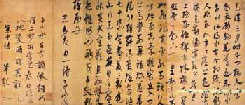
Baguwen(Eight-Part Essay) refers to a style of Chinese traditional writings specifically for imperial examinations in the Ming and Qing dynasties (1368-1911), which requires four couples of parallel sentences with each sentence in accordance with tonal patterns and rhyme schemes.
Baguwenoriginated in the Northern Song Dynasty (960-1127) when Wang Anshi implemented the political reform. He thought that it was flashy but impractical to select scholars to be government officials only by poems. Hence he decided to test Confucian classics argumentations. At that time, there were no strict rules for the form of the articles, and the sentences did not have to be in line with tonal patterns and rhyme schemes, but some examinees applied parallelism unconsciously in their articles. The imperial examinations in the Yuan Dynasty (1271-1368) generally followed the system of the Song Dynasty (960-1279). In the first year (1368) of the Hongwu reign in the Ming Dynasty (1368-1644) held an imperial examination, in which strict rules and forms were set up. In the Chenghua reign, with the advocacy of Wang Ao, Xie Qian and Zhang Mao, etc.,Baguwengradually began to prevail with strict forms and patterns. It was not until the Hundred Days of Reform in 1898 thatBaguwenwas abolished.
The general features ofBaguwenare as follows: firstly, all the titles for examinations are from original texts ofThe Four BooksandThe Five Classics; secondly, the content must be in accordance with the commentary of the Zhu and Cheng school; thirdly, there is a fixed format for the structure of the article.
There is also a limitation for the number of words forBaguwen.In the beginning of the Ming Dynasty, it was 500 words and grew to 700 hundred in the Qianlong reign in the Qing Dynasty (1644-1911).
Baguwenwas a required course in almost all the private and public schools in the Ming and Qing dynasties. In imperial examinations at all levelsBaguwenwas needed, but all of its utility ended as soon as one passed the exam. A lot of men of insights in the Ming and Qing dynasties detestedBaguwen.It is a natural result of development of history thatBaguwengot abolished finally.
